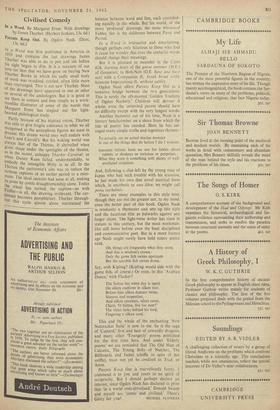Civilised Comedy
In a Word. By Margaret Ernst. With drawings 13s. 6d.)
In a Word was first published in America in 1939 and contains the last drawings James Thurber was able to do in pen and ink before his sight began to dim. It is a measure of our love for him that we have gone on buying New Thurber Books in which his sadly small body of work was re-edited, retitled, often little more than rearranged. This is not new Thurber. Most of the drawings have appeared in one or other or several of the anthologies, But it is good to see them in context and him simply as a work- manlike illustrator of some of the words that Margaret Ernst has singled out for light- hearted philological study. Partly because of his blurred vision, Thurber was able to give fragile substance to what we all recognised as the amorphous figures we meet in dreams. His dream world may well endure with Lear's and Carroll's. But his waking world was always that of the Thirties. It shrivelled when given shape under the spotlights of the theatre, as in the recent, unhappy Thurber Carnival; or when Danny Kaye failed, understandably, to embody the intangible Mitty in us all. In the Thirties the cartoonist's aim was to reduce the verbose captions of an earlier period to a mini- mum. The ideal cartoon had none at all, making its point by comic draughtsmanship alone. Today
i-i the wheel eel has turned, the caption—as with Pettier—is all, the drawing irrelevant. The car- toonist becomes pamphleteer. Thurber through- out this cycle almost alone maintained the balance between word and line, each contribut- ing equally to the whole. But his world, of the more 'profound' drawings, the more whimsical Fables, lies in the doldrums between Passe and Period.
In a Word is instructive and entertaining, though perhaps only hilarious to those who find it cause for wonder that over the centuries words should change their meanings.
But it is pleasant to meander in the Calm (Gk. burning heat) of the goose summer (M.E.) of Gossamer, to Hob-Nob (0.E. have and hare not) with a Companion (L. break bread with), however Impecunious (L. without cattle).
Ogden Nash offers Parents Keep Out as a tentative bridge between the two generations. This is surely the oft-mooted 'Golden Trashery of Ogden Nashery.' Children will devour it whole, even the uninvited parent should have no difficulty except with the very longest words.
Another humorist out of his time, Nash is a literary beachcomber on a shore from which the tide of poetry has receded. Here he has sal- vaged many simple truths and ingenious rhymes:
To actually see an actual marine monster
Is one of the things that do before I die I wonster.
Innocent infants have no use for fables about
rabbits or donkeys or tortoises or porpoises, What they want is something with plenty of well-
mutilated corpoises.
And, following a clue left by the young man of Japan who had such trouble with his scansion, he has made his own that novel metrical form which, in antithesis to vers libre, we might call prose enehalnee. There are many examples in this style here, though they are not the greater nor, to my mind, even the better part of this book. Ogden Nash is resolutely a rhymester and sets up this style and the facetious title as bulwarks against any larger claim. The light-verse writer has risen in stature in this century, but the most workman- like still bows before even the least disciplined and communicative poet. But in a more formal age Nash might surely have held minor poetic rank.
Oh, things are frequently what they seem, And this is wisdom's crown:
Only the game fish swims upstream But the sensible fish swims down.
Say, with Kipling? (Kipling would side with the game fish, of course.) Or even, in this 'Arabian Dance,' with Flecker?
The Sultan lies when day is spent On silken cushions in silken tent. Before him silken dancers twine, Sinuous and serpentine, And silken courtiers, silent never, Chant, '0 Sultan, live for ever!' The vizier lurks behind his lord, Fingering a silken cord.
This and the whole of the enchanting 'New Nutcracker Suite' is new to me. So is the saga of 'Custard,' first and best of cowardly dragons, and many other 'Youngerly' poems published for the first time here. And under 'Elderly poems' we are reminded that The Old. Man of Calcutta, The Young Belle of Natchez, The Billboards and Isabel (chime in spite of her sniffle), must not yet be, credited to Trad. or Anon.
Parents Keep Out is marvellously funny. I commend it to you and yours in no spirit of reciprocity. But I should perhaps declare an interest, since Ogden Nash has declared in print that 'in a world over-drivelised,' Donald Swann and myself are 'comic and civilised,' There's










































































 Previous page
Previous page